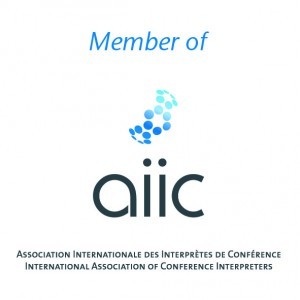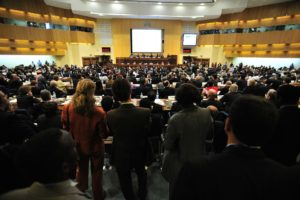Interpreter confidentiality has become a sensitive topic over the past couple of years, especially in the political and diplomatic arena, so it is probably time to discuss the issue in more detail as it pertains to clients of interpretation companies.
 There are some unique lucky professions that expose their practitioners to a variety of different life situations, from sacred to profane. Have you ever worked in the United Nations, inside an aircraft engine, and in a cow shed within one week? Quite possibly, some interpreters have. We are witnesses to so many different situations, scenarios and circumstances that watching “live” TV shows makes no sense any longer: a perfect “fly on the wall” job.
There are some unique lucky professions that expose their practitioners to a variety of different life situations, from sacred to profane. Have you ever worked in the United Nations, inside an aircraft engine, and in a cow shed within one week? Quite possibly, some interpreters have. We are witnesses to so many different situations, scenarios and circumstances that watching “live” TV shows makes no sense any longer: a perfect “fly on the wall” job.
The job comes, however, with a few challenges. One of them is being exposed to quite a lot of confidential, personal, and sensitive information clients share in conversations or presentations. Some of it can be quite scary or shocking, such as court interpreter work, some can just be hilarious, for example, observing how differently the same corporate employee is talking to his subordinates and his management, and some may decide the fate of the world, such as the over the phone interpretation of conversations between the US and the Soviet leaders during the Cuban Missile Crisis.
 We come here to the notion of a language interpreter as a “conduit”: in any situation a professional interpreter is used, he has no “life of his own” in the sense that he is just a transmitting link between parties who are communicating through the interpreter. And interpreters insist on being treated in this “depersonalized” way, it actually makes our job easier.
We come here to the notion of a language interpreter as a “conduit”: in any situation a professional interpreter is used, he has no “life of his own” in the sense that he is just a transmitting link between parties who are communicating through the interpreter. And interpreters insist on being treated in this “depersonalized” way, it actually makes our job easier.
This notion of a “conduit” is officially supported by some courts and jurisdictions for court and medical interpreters, but we need to remember that, regardless of specialization, all professional interpreters are to adhere to it in the strictest possible sense, no matter if it is legally recognized or not.
Interpreters also do not have an “opinion” about what they are interpreting, they do not direct the conversation in any way, nor do they promote their own agenda. They are not interested in the outcome of a conversation.
Without this neutrality language interpretation is not possible.
 (Incidentally, if you are not an interpreter, you may think it is “boring” because you always “repeat” other people’s words and cannot express your own opinion. This is one of the reasons why some students of interpretation schools quit after some time – they simply fail to realize that language interpretation is not mere “repeating words” but a very highly creative process of “recreating” a speaker’s personality in a different language based on the rules of that language and culture. The emphasis of interpreter’s efforts is, therefore, not on having an opinion, but on becoming a perfect “transparent” channel of communication between cultures.)
(Incidentally, if you are not an interpreter, you may think it is “boring” because you always “repeat” other people’s words and cannot express your own opinion. This is one of the reasons why some students of interpretation schools quit after some time – they simply fail to realize that language interpretation is not mere “repeating words” but a very highly creative process of “recreating” a speaker’s personality in a different language based on the rules of that language and culture. The emphasis of interpreter’s efforts is, therefore, not on having an opinion, but on becoming a perfect “transparent” channel of communication between cultures.)
But in practical terms, it also means that the information the interpreter heard or was exposed to is to die with the interpreter. The “professional confidentiality” is another principle without which language interpretation is not possible.
 It is called “professional secrecy” sometimes, but we prefer “confidentiality” because “secrecy” has that unneeded ring of “cloak and dagger” that is certainly not there and also because it is probably a direct translation from the French “secret professionnel.”
It is called “professional secrecy” sometimes, but we prefer “confidentiality” because “secrecy” has that unneeded ring of “cloak and dagger” that is certainly not there and also because it is probably a direct translation from the French “secret professionnel.”
Interpreters are in a way “confidants” of the people they interpret, and it is a special moral obligation.
That is why from the very inception of the profession, as we know it today, confidentiality has always been one of the cornerstones and ruling principles.

InterStar Translations founder is a member of the International Association of Conference Interpreters.
Some interpreter associations simply require it as condition of membership. The International Association of Conference Interpreters (AIIC) states in its Code of Professional Ethics: “Members of the Association shall be bound by the strictest secrecy, which must be observed towards all persons and with regards to all information disclosed in the course of the practice of the profession at any gathering not open to the public.” and continues to explain: “If statesmen are to speak freely, they must be able to trust interpreters unreservedly not to reveal confidential information. Hence the importance of upholding the cardinal principle applied worldwide since WWII, that interpreters should never be obliged to give testimony.”
While it may be a moral and not a legal obligation, it is what defines the profession and this is what a professional interpreter would adhere to fervently regardless of any existing legal nondisclosure commitments.
In this sense, a Non-Disclosure Agreement is simply a manifestation of this moral obligation that is already so deeply entrenched in the interpreter collective and individual psyche, and that is why on some level, best interpreters do not need NDAs.
 We simply believe that exposing client information would betray so deeply the spirit of the profession, that it is unthinkable. It will also create a permanent conflict inside the interpreter, damage his integrity as a professional, and will make future practice impossible or hypocritical.
We simply believe that exposing client information would betray so deeply the spirit of the profession, that it is unthinkable. It will also create a permanent conflict inside the interpreter, damage his integrity as a professional, and will make future practice impossible or hypocritical.
This is also the difference between professionals and amateurs who either do not know about the principle of confidentiality or do not consider it too important. Poor hiring practices, therefore, expose clients to potential damage from the “interpreters” who may not necessarily be malevolent, but simply do not know what they are doing.
The highest echelon of conference interpreters takes the confidentiality principle a step further, actually. Clearly, the content of conversations is confidential, but some of the interpreters do not disclose even the names of clients they worked with or for, because that information is confidential as well. These interpreters do not have or need resumes and get all their work from referrals, they do not need to advertise. If you get them for your event, it is like winning a lottery: it is guaranteed impeccable quality, albeit with a hefty price tag, the best service money can buy.
 Of course, we are all humans after all, and it is, oh, so tempting to say: I worked with President X or Governor Y but, after all, the number of names you can boast with is limited, and in this elite market it is simply not needed!
Of course, we are all humans after all, and it is, oh, so tempting to say: I worked with President X or Governor Y but, after all, the number of names you can boast with is limited, and in this elite market it is simply not needed!
This should be a lesson to the new generation of interpreters. In the age of social media there is a very delicate balance that we should strike between creating credibility as a professional and client confidentiality. That is why “interpreter memoirs” by colleagues (“Look how great I am!”) are generally disliked by truly professional interpreters, and posting your photos in the booth or in a conference room is a liability and may, actually, damage your reputation in the interpreter community, if the photos have not been published in the open press previously.
 All that underscores, once again, how important it is to hire truly professional interpreters, who will present your event in the best possible way in a different language.
All that underscores, once again, how important it is to hire truly professional interpreters, who will present your event in the best possible way in a different language.
Once of the most common complaints we hear from new prospective clients is: “We had problems with interpreters in the past!” If you hire on the elite interpreter market, it simply cannot happen.

